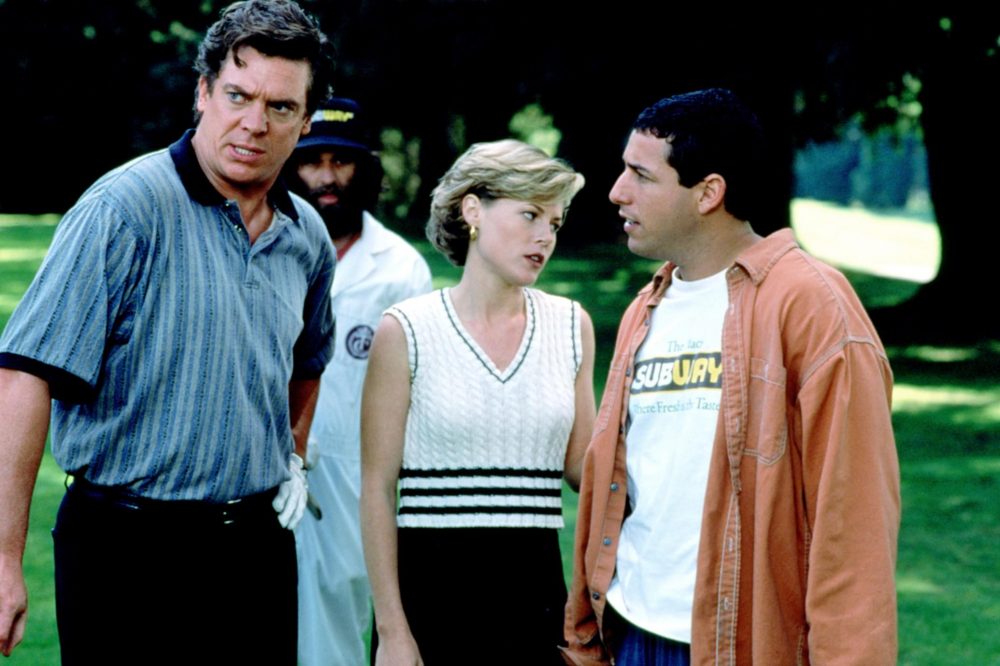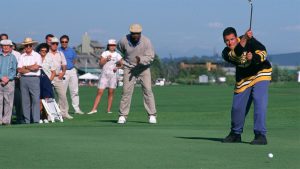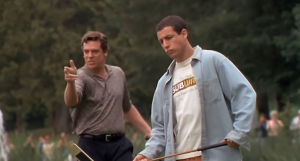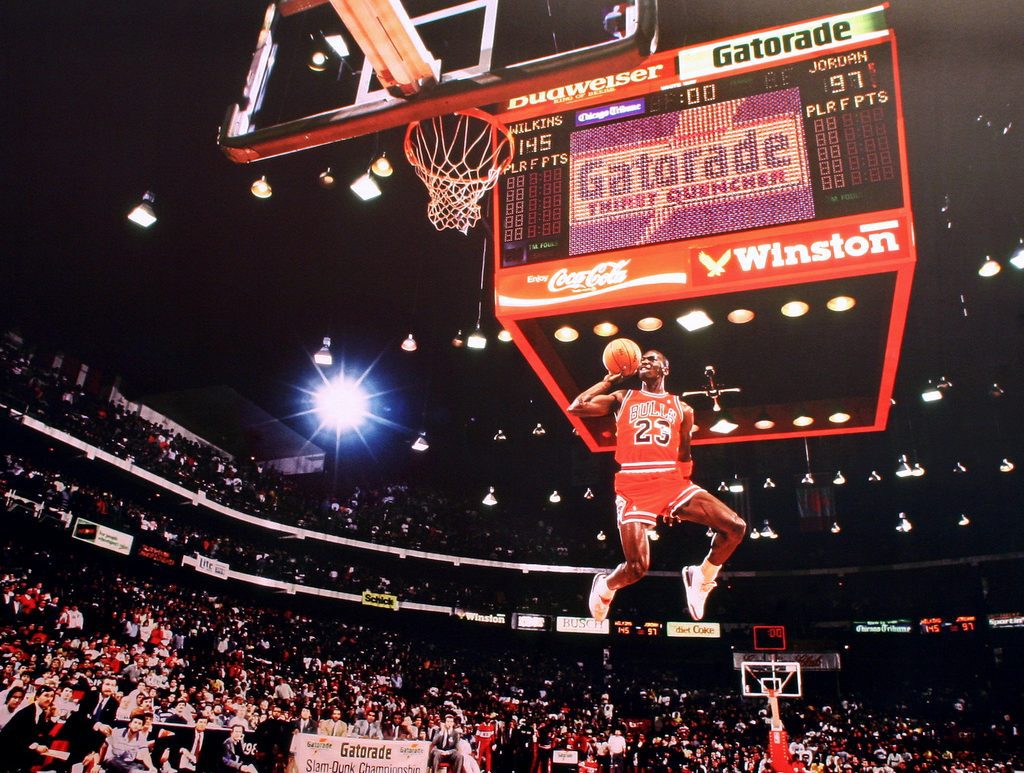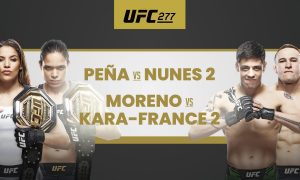21 years ago the sports world was forever altered when Happy Gilmore left behind a dead end and virtually non-existent hockey career to join the PGA Tour. Even though Gilmore did not achieve much success on the tour early on, his controversial and wild demeanor allowed him to gain a massive, rabid and demographically unique fanbase in a very short amount of time. Happy Gilmore quickly became the popular golfer in the world, and he soon solidified himself as one of the biggest draws in the history of the sport.
Meanwhile, the #1 ranked golfer in the world in 1996 was 11-year veteran Shooter McGavin. McGavin had been racking up tournament wins throughout the 90’s, and 1996 was one of his best years ever, but a Tour Championship still eluded him. Golf fans began wondering, “Can Shooter win the big one?”
Though Gilmore was rarely near McGavin on tournament leaderboards, a feud between the two had been building beneath the surface ever since McGavin was on hand to witness Gilmore win the Waterbury Open, an amateur tournament that rewarded a spot on the professional tour to whomever the winner was. McGavin (the traditionalist) and Gilmore (the rebel) were nature foils and bitter enemies, and their rivalry came to a head at the 1996 Tour Championship. The highly coveted Gold Jacket was not the only prize being played for; the longtime home of Happy Gilmore’s grandmother, bragging rights, and the golfing career of Happy Gilmore were on the line as well.
This is the oral history of the 1996 Tour Championship, as told by the individuals who were a part of it.
Verne Lundquist (Former CBS Sports Commentator): I have had the privilege of being on the call for so many unbelievable sports moments in a career that has spanned five decades. Multiple golf tournaments, high stakes college football games, the NCAA Tournament. I say with complete certainty that the 1996 Tour Championship was easily the most memorable sporting event I’ve ever been involved with. Never, in my life, did I expect things to go down as they did. There was no way to anticipate that we were about to be the firsthand witnesses to the craziest tournament in the history of professional golf.
Part I: The Build-Up
Doug Thompson (Former PGA Commissioner): Before Happy joined the tour in the spring of 1996 we were facing an identity crisis. We were struggling to transition from the era of Arnold Palmer and Jack Nicklaus to whoever the next generation would bring us. Guys like Greg Norman and Nick Faldo and Seve Ballesteros did a fine job bridging that gap, but nobody on the tour in 1996 was able to make solid connections with our fanbase, and our fanbase as a whole was dwindling.
Mike Tirico (Former ESPN Golf Commentator, Current NBC Sports Golf Commentator): It was rarely mentioned at the time, but the PGA was on the verge of facing a full-blown crisis in the mid-nineties. Attendance was down all across the board and broadcast numbers were slipping as well. The problem wasn’t the product. There were plenty of talented golfers on the tour, but the fans just never got behind any of them the same way they did with guys like Palmer and Nicklaus, or later on Happy or Tiger or even Phil.
Doug Thompson: At that time we weren’t putting much of an emphasis on our brand, or rather, our golfer’s brands. I suppose that’s our own fault, but in all honesty we didn’t have much to work with. The best golfer in the world from the early nineties well into 1996 was Shooter McGavin, but for whatever reason, Shooter just couldn’t relate to the fans of golf.
Virginia Venit-Gilmore (Former PGA PR Director, Wife of Happy Gilmore): Shooter McGavin was a pompous asshole. Impossible to work with, and I’m sure he hasn’t changed. He said all the right things to the media, but it was all B.S. But I’m admittedly biased given who my husband is.
Shooter McGavin (Former Pro Golfer, 1996 Tour Championship Runner Up): I didn’t care about making friends on the tour or being liked. I cared about winning. And nobody won more than Shooter.
Shooter McGavin is 14th All-Time in PGA Tour Tournament Victories.
Scott Van Pelt (ESPN Golf Analyst): I think people just hated those patented Shooter Pistols. It got old really quick.
Jim Nantz (CBS Sports Golf Commentator): Shooter McGavin was an amazing golfer. He was a three-time All-American in college and he had a great deal of success as soon as he turned pro. Everyone in the media expected him to be passed the torch at some point in time, but it just kept getting pushed back.
Virginia Venit-Gilmore: 1994 was my first year involved with the PGA, and everyone was expecting it to be Shooter’s year. It didn’t happen. Then everyone said 1995 was going to be Shooter’s year. Didn’t happen. I was promoted to Director of Public Relations in 1996, right when Shooter started getting hot.
Doug Thompson: Shooter got off to such an incredible start in 1996, and we thought it was finally happening. We started prepping him to be our guy. Sending him to promotional shoots, setting him up with additional sponsors. It seemed like our problem was finally solved. Then Happy Gilmore showed up on the tour and we had a completely new problem to manage.
Verne Lundquist: Happy Gilmore was … eccentric. (Chortling)
Jason Kapps (Former Amateur Golfer): Happy Gilmore is the reason why I never made the pro tour, so I’m a bit jaded. But he was entertaining, and he was so powerful off the tee, I’ll give him that much.
Jason Kapps finished second to Happy Gilmore in the 1996 Waterbury Open. This was the closest he ever came to securing a full-time spot on the professional tour.
Daniel Lafferty (Former Amateur Golfer): I was paired with Happy during the Waterbury Open, and even then people were mesmerized by him. That was before anyone in the sports world even knew his name.
Gary Potter (Former Pro Golfer): Happy was a character. Great, infectious energy. Rough around the edges, but all in all he was a fantastic addition to our sport. I loved that bull dance and so did the fans, and that’s what matters the most.
Jim Nantz: People absolutely loved Happy Gilmore. I was on the call at a few events he participated in before he was contending in any tournaments, and he was massively popular. People flocked to him. And that wasn’t always a good thing because he was getting himself into some unsavory predicaments on the course.
Shooter McGavin: Gilmore was a disgrace to the game of golf. Just look at what he did in Portland.
Gary Potter: Happy and I were paired together at the AT&T Invitational in Portland, and being a veteran I tried to give him some advice throughout the day. He was playing a phenomenal round of golf, but then when he missed that short putt on 17, he came unglued.
Happy Gilmore finished last in the 1996 AT&T Invitational
Doug Thompson: I wanted to kick Happy off of the tour after the AT&T Invitational, but Virginia Venit convinced me otherwise. Our TV numbers were huge and all of our upcoming events were selling out when fans found out Happy would be there. From a business perspective it was a risky proposition, but there was an undeniable amount of upside as well.
Virginia Venit-Gilmore: My husband was a headache when he joined the tour, but I saw a certain untapped demographic that we at the PGA could appeal to by highlighting him. Doug made it my sole responsibility to contain him and mold him, and I had my hands full. He became so popular so fast, but he was always getting himself in trouble. And it didn’t help that he didn’t even really want to be a golfer.
Happy Gilmore (Former Pro Golfer, 1996 PGA Tour Champion): I hated golf. I thought it was a stupid game. I was only planning to play until I made enough money to buy my Grandma’s house back, and then I was going to start training for the upcoming hockey season again. But money stopped being my only motivation when I met Shooter McGavin.
Mark Lye (Former Pro Golfer): Shooter was immediately threatened by Happy’s presence. That’s why he roped him into meeting on the 9th Green at 9 o’clock. Had Shooter not done that I don’t think Happy would have had any problem with him. Happy felt like it was a personal attack.
Shooter McGavin: It’s not my fault that Gilmore couldn’t take a joke. It’s also not my fault that he went ballistic on Bob Barker at the Pro-Am.
Bob Barker (Former host of The Price is Right): I was Happy’s partner in the 1996 Pepsi Pro-Am, and I have to admit, I was thrilled to have the opportunity to play with him. I thought between his ability to drive the ball and my short game, we would have a real chance to win the whole thing. Nick Faldo and I had won the previous year, so I was expecting to repeat as champion. I did not repeat as champion.
Doug Thompson: We purposely paired Happy with Bob Barker to try to build some momentum for him. Mr. Barker was one of our better celebrity golfers, and we saw this as a possible point in time where we could push Happy as our guy. He had been tremendously well-behaved in the handful of tournaments leading to that one. Then this deranged fan, this Donald Reilly shows up and ruins everything.
Shooter McGavin: Like I told the PGA Board of Directors and the police already, I don’t know who Donald Reilly is.
Donald Reilly relentlessly taunted Happy Gilmore throughout the 1996 Pepsi Pro-Am, and eventually hit Gilmore with a car during the final round of the 1996 Tour Championship. Reilly claimed that Shooter McGavin paid him to interfere both times; Shooter McGavin has not only denied these claims, and but also denied knowing who Donald Reilly was numerous times since. Reilly declined to comment for this feature.
Happy Gilmore: I always figured Shooter put that jackass up to it.
Mark Lye: Based on what I know about Shooter McGavin, and Shooter’s feelings towards Happy Gilmore, it wouldn’t surprise me if he was in some way associated with that guy (Donald Reilly). I mean, Shooter bought Happy Gilmore’s grandmother’s home in an auction that Happy was bidding in. You can’t tell me he did that for any other reason than to needle Happy.
Mike Tirico: Whether anyone put Reilly up to interfering or not, there was no possible way the PGA could go without reprimanding Happy Gilmore. He was involved in an all-out brawl on national television with one of the most respected and well-known game show hosts ever.
Jim Nantz: I was shocked when I found out Happy Gilmore wasn’t going to be thrown off the pro tour. The entire sports world watched as he assaulted Bob Barker. What a moment.
Shooter McGavin: Gilmore should have received a lifetime ban from pro golf. Instead he got a slap on the wrist and a Subway sponsorship. And then he murdered Chubbs Peterson and got away with it too.
Chubbs Peterson was a former pro golfer who was forced to retire from Golf in the middle of his prime after an alligator bit his right hand off during a tournament. For months before his death, Peterson served as a mentor to Happy Gilmore. Peterson’s death, which came three days before the 1996 Tour Championship, was ruled an accident.
Virginia Venit-Gilmore: Happy was really broken up when Chubbs died. They had gotten extremely close. I was concerned that if Happy did play in the Tour Championship, he would suffer a setback if things weren’t going his way.
Happy Gilmore: I owe all of my success to Chubbs. If it weren’t for him I would probably still be going to NHL tryouts.
Verne Lundquist: We honored Chubbs Peterson over the course of the weekend, giving him the respect any beloved member of the golf community absolutely deserves. But very quickly we all realized that we had a doozy of a tournament on our hands, and our focus shifted to the memorable duel between Shooter McGavin and Happy Gilmore.
Part II: The Tournament
Ricky Denegri (Former Pro Golfer, 1996 Tour Championship 2nd Runner-Up): Everybody seems to forget that I was right there in contention too. I was three strokes off the lead heading into the final round, and only one stroke back when Happy and Shooter teed off on 18. But of course, everyone just wants to talk about those two.
Doug Thompson: We purposely paired Happy and Shooter together on the very first day of the Tour Championship. We didn’t know how close they would be later on in the tournament, so we couldn’t pass up the opportunity to get them playing together on Thursday.
Daniel Lafferty: CBS definitely geared their coverage towards Happy and Shooter. It was almost as if the other 61 guys in the tournament didn’t exist. I know if I were playing in the tournament I would have been upset.
Verne Lundquist: I was criticized by some fans for emphasizing the Gilmore/McGavin pairing a little too much throughout the day. But these same fans are likely the ones who say that the 1996 Tour Championship is the greatest golf tournament ever. And if it weren’t for those two, that wouldn’t be the case.
Brett Armstrong (Pro Golf Caddy): I was Shooter’s caddy for the Tour Championship, and being there witnessing those two go back and forth with trash talk throughout the day was remarkable. They were jawing at each other the entire time. I’ve never seen anything like it.
Happy Gilmore: Shooter started talking before we teed off on day one. He was making comments about Grandma’s house and how he was going to turn my old bedroom into his trophy room. I wanted to tell him he should shove all those trophies up his ass, but I didn’t.
Mark Lye: I’m not surprised Shooter talked about Gilmore’s family. Shooter had a way of digging deep with his trash talk, and then acting like it was just business after the fact. And that was with guys he didn’t necessarily hate. Shooter hated Happy Gilmore.
Gary Potter: I think Happy let his play do the talking. He had a great aura about him during the first few days of the tournament. Solid energy. Very confident.
Virginia Venit-Gilmore: I know that Happy was talking back to Shooter, but the most damaging thing he did to Shooter was learn how to putt. I think that probably got in Shooter’s head more than anything else.
Brett Armstrong: When Happy sunk that long putt on the very first hole of the tournament with that hockey stick putter, Shooter was definitely rattled. He looked right at Shooter and said “Happy learned how to putt.” I think at that moment Shooter knew he would really have to bring his A game if Happy wasn’t going to be three-putting every time he was on the green. Once Happy nailed a few putts he would typically miss, he was all over Shooter.
Shooter McGavin: People act like Gilmore got in my head. That just wasn’t the case. I was in the lead after the first two rounds of the tournament. Shooter’s confidence was just fine.
Verne Lundquist: Happy’s improved short game was not something I expected to be commenting on throughout the tournament. He was sensational.
Doug Thompson: We had no clue that Happy had worked on his putting during that month suspension. It was a surprise to all of us, so at that point we felt very good about our decision to pair Happy with Shooter.
Happy and Shooter stayed paired throughout the duration of the tournament. At the end of the first round, Gilmore and McGavin were co-leaders of the field. McGavin took a one stroke lead after the second round, and heading into the final round of the tournament, Happy Gilmore led Shooter McGavin by one stroke.
Virginia Venit-Gilmore: Happy felt good on Sunday morning. He was having fun and playing the best golf of his life. I think if Donald Reilly didn’t hit him with his car he would have pulled away from Shooter and won easily.
Shooter McGavin: I was shaken up by the fact that some crazed fan drove his car right onto the course and hit a golfer. It could have just as easily been me, or anyone else that was injured.
Doug Thompson: This was a public relations nightmare. How on earth did we allow a man to drive his car onto the course in the first place? What would have happened if Happy Gilmore couldn’t have continued playing, or God forbid, if he suffered serious, life-threatening injuries? Our TV ratings for the first three days of the tournament were as high as they’d ever been, and Happy was our most popular golfer. I was freaking out.
Dr. Simon Webb (Former PGA Physician): I advised Mr. Gilmore to stay off his feet for the next week or so in order to let his injuries heal. He wasn’t seriously injured immediately after the incident, but if he continued to play it was likely that he would aggravate his shoulder injury to the degree that it may require surgery after the tournament. And that’s exactly what happened.
Bob Barker: I was watching the tournament from home, and I thought that was the end of Happy Gilmore. I figured if I could knock him out then a car would definitely be able to.
Happy Gilmore: I knew I had to keep playing. Play through the pain. If I dropped out of the tournament Grandma wouldn’t get her house back.
Verne Lundquist: I knew Happy had to be a tough guy, coming from a hockey background and all. But he got hit by a car! Are you kidding me? I thought there was no way he’d be able to play after this!
Happy did continue to play, but he struggled. After the 9th hole, he trailed Shooter McGavin by four strokes.
Ricky Denegri: Heading into the final round we all felt like Happy had a better chance of pulling away from the pack than Shooter did. When all of us other golfers saw Happy sliding down the leaderboard we thought we had a legitimate chance to win this thing.
Brett Armstrong: Shooter thought he had it in the bag. Not only did Happy no longer have the power to drive the ball from tee to green, he was in his own head too.
Happy Gilmore: Before he died, Chubbs told me I had to go to my Happy Place when I was faced with tough situations. I was trying to get there, but I just couldn’t do it.
Shooter McGavin: I genuinely felt bad that Gilmore got hit by the car, but I didn’t feel bad that he was losing it on national television … again.
Doug Thompson: Happy started unraveling, and I made the call to shift some of the coverage’s focus onto other golfers in contention. I didn’t want to highlight any sort of breakdown Happy may have, because it felt like it was coming.
Virginia Venit-Gilmore: I was trying to calm Happy down in between holes, but he wasn’t mentally with it. I knew the only way he could turn things around was if he talked to his Grandma.
Happy Gilmore: When Virginia brought Grandma over to talk to me that’s when I got all the momentum back. Grandma took a lot of the pressure off me, and having those two there together made me realize that everything was O.K.
Verne Lundquist: Happy shanked one into the woods off the tee at the 10th hole, but then he came back with an unbelievable shot through he trees onto the green. As Happy walked out of the woods he said something to Shooter McGavin. I don’t know what was said, but right then I turned to my broadcast partner Jack Beard and told him that Happy wasn’t out of it yet.
Scott Van Pelt: It was really easy to root for Happy Gilmore. Shooter McGavin was the typical smarmy, upper-class golf snob that a lot of fans were tired of, and Happy was the exact opposite of that. He was the every man, and he faced a ridiculous amount of adversity in that final round. Fans love watching athletes overcome adversity.
Brett Armstrong: The crowd really got into it when Happy started surging, and Shooter didn’t handle it well.
Ricky Denegri: The entire final round was chaotic. All of the other golfers could hear the crowds cheering for Happy and trying to distract Shooter on every hole. It was distracting for us.
Jim Nantz: Shooter and Happy approached the 18th hole and they were tied atop the leaderboard. I was very envious of Verne Lundquist for having the privilege to call that final hole.
Happy Gilmore: I know Shooter was feeling way more pressure than I was when we teed off on 18. He was about to blow a four stroke lead in the tour championship to a hockey player who had gotten hit by a car three hours earlier.
Mike Tirico: Shooter McGavin’s forte as a golfer was his control of the ball, and he had no control whatsoever when he teed off on the final hole. He was reeling.
Verne Lundquist: Happy’s shot off the tee on 18 was just magnificent. 15 feet short of the hole, and considering how he had been putting, it looked like he’d birdie the hole and become Tour Champion.
Shooter McGavin: I have never been a part of such an embarrassing tournament as the 1996 Tour Championship. The crowd was whistling and screaming and hollering every time I was about to shoot. I had an over-sized beach ball thrown at me when I was putting on the 16th green, and I still made the putt by the way. And on 18, I had to hit it off of the foot of one of Gilmore’s fans. This same fan then threatened to be waiting for me in the parking lot after the tournament was over. It’s no wonder Doug Thompson isn’t the PGA Commissioner anymore.
Doug Thompson resigned as PGA Tour Commissioner in 1999 amid many complaints by fans and golfers alike. However, he was not fired or formally relieved of his duties. Shooter McGavin ended up shooting for par on the 18th hole. Happy Gilmore was faced with a birdie putt for the championship when another obstacle got in his way.
Doug Thompson: Happy had a chance to putt for a victory on the 18th hole, and it would have been a beautiful end to an otherwise disastrous tournament. But I was foolish for thinking that things end in such smooth fashion if the entire tournament had been so unpredictable from start to finish.
Virginia Venit-Gilmore: You could see the TV tower start to sway back and forth when Happy and Shooter were approaching the 18th green. There had to be ten to fifteen fans who climbed it to try to get a better view.
Verne Lundquist: We hadn’t gotten any word in the booth that the TV tower near the 18th hole might come down. We obviously knew it had been hit by the car that Donald Reilly was driving, but no one had told us that it was that unstable. So I, just like the millions of fans watching on television around the world, was absolutely shocked when it came down just feet in front of Happy Gilmore.
Brett Armstrong: I remember immediately looking at Happy when the tower came down, and he didn’t flinch. He was unusually calm considering he was nearly crushed by thousands of pounds of steel for the second time that day.
Happy Gilmore: I didn’t really panic. It was disbelief more than anything else. I just thought to myself, well how the hell can I make this shot?
Doug Thompson: My one big regret, and I have many, of the 1996 Tour Championship was not delaying the finish in order to remove the TV tower from the 18th green. Regardless of what happened after the fact, I think that was my biggest error of judgment.
Shooter McGavin: There was no way in hell I was going to let Doug get that green cleared off for Gilmore’s shot. Not if I had to shoot it off of a spectators foot. No way.
Scott Van Pelt: It’s laughable that Happy Gilmore was forced to have to make that putt with the tower on the green. Are you kidding me?
Charles Barkley (Former NBA Player, NBA Analyst, Occasional Golfer): Listen, Happy Gilmore’s my guy, but first of all, it was just terrible that he had to shoot with that jungle gym lookin thing on the course. I mean, that’s just crazy. Second, look, that guy Doug Thompson, I never met the guy, but he deserved to be fired as Commissioner of the PGA Tour because so many things just went wrong during that tournament. He’s a damn fool.
Virginia Venit-Gilmore: I wanted Happy to try to two-putt his way into a tie with Shooter. They would have went to a sudden death playoff if they were tied after the 18th hole, and I knew he could have beaten him there.
Ricky Denegri: Nobody in the clubhouse thought Happy would try to shoot through the tower to birdie the hole. We all thought he was going to try to force a playoff.
Shooter McGavin: What happened after that tower fell is proof that Gilmore had a horseshoe stuck up his ass.
Gary Potter: Happy had such incredible energy on the back nine and momentum was on his side. I would have advised him to do exactly what he did. He sent the ball home.
Brett Armstrong: Before he shot, Happy told Shooter straight up that he was about to beat him. I thought he was crazy. It didn’t seem like there was any way he could beat Shooter on one shot.
Verne Lundquist: Happy took his shot, and it was like a slap shot, and the ball went right into the windshield of the very same Volkswagen that ran him down just hours earlier. That was such a risky shot. What would have happened if the ball broke the glass and landed in the drivers seat?
Mike Tirico: Happy has since claimed that he envisioned exactly how the ball would roll around that TV tower and end up in the hole. I just don’t see how that’s possible.
Jim Nantz: From the time Happy Gilmore made contact with the ball, it took exactly 30 seconds until the ball found the bottom of the cup, and within half a second of that improbable shot going down, the entire crowd was in a frenzy. Now that’s what I call a Happy Ending!
Skip Bayless (Co-Host of FS1’s Undisputed): Personally, I’ve always believed that Happy Gilmore’s shot on the 18th hole at the 1996 Tour Championship is one of the most overrated, over-hyped and downright lucky moments in sports history. There have been at least fifty more impressive shots in my lifetime than that one!
Happy Gilmore: The night Chubbs died we played mini-golf together because he wanted me to learn how to putt. I had to make a shot almost exactly like the one at the Tour Championship on one of the holes there. It was like he knew I was going to have to make a shot like that, and then I made it. It was a perfect ending. I won the Gold Jacket. Grandma got her house back. I ended up marrying Virginia. And I beat Shooter McGavin.
Shooter McGavin: Gilmore never golfed again after the 1996 Tour Championship. You know why? Do you? It’s because he knew I would beat him every single time. He beat Shooter once. Everyone loves a guy who wasn’t a loser one time in his life. Congratulations Gilmore, one hell of a career ya had!

